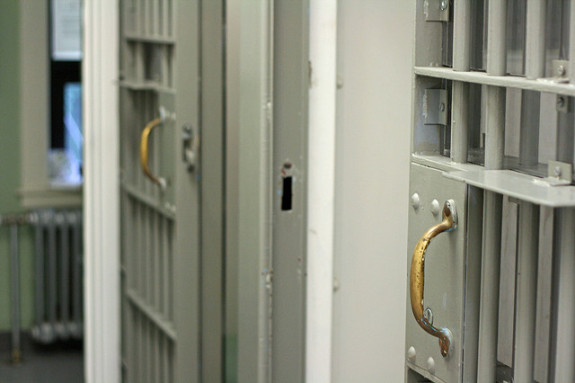
Criminal justice issues will be part of nationwide campaign for the next several years. (Photo via My_southborough/ Creative Commons)
By Ashley Lopez
Florida Center for Investigative Reporting
The American Civil Liberties Union announced it will launch a multi-year campaign targeting battleground states, such as Florida, in an effort to make criminal justice reform a key political issue during upcoming elections.
The New York Times reports the political arm of the ACLU got the largest grant in its history—$50 million—to mount this eight-year campaign across the country.
The goal of the campaign, financed by George Soros’s Open Society Foundations, is to slash an incarceration rate that has tripled since 1980. There are currently some 2.2 million prisoners in the United States.
The campaign aims to translate into state and federal policy a growing belief among many scholars, as well as of a coalition of liberal, conservative and libertarian political leaders, that the tough-on-crime policies of recent decades have become costly and counterproductive.
In that view, widespread drug arrests and severe mandatory sentences are doing more to damage poor communities, especially African-American ones, than to prevent crime, and building ever more prisons that mostly turn out repeat offenders is a bad investment.
The campaign is likely to face strong opposition from some law enforcement officials, prosecutor groups and conservative experts who argue that tough sentencing policies have played an important role in driving down crime rates. The Republican electoral victories this week could also stiffen resistance to sweeping change.
There have been calls for sweeping criminal justice reform in Florida for years now. However, any substantive effort to make big changes has largely failed in the Florida Legislature.
Florida’s criminal justice policies have been criticized for some time.
For example, five years ago it was reported that Florida was leading the nation for locking up children in adult jails.
The Tampa Bay Times (then St. Petersburg Times) reported in November 2009:
As the U.S. Supreme Court heard appeals in two Florida juvenile cases, scholars took note that the state leads the nation in locking up kids for life who committed crimes in which no one died.
That isn’t Florida’s only distinction.
The state sends more children to adult jails and prisons, period. Laws make it easy for prosecutors to pluck young people out of the juvenile justice system before they turn 18.
And in sheer numbers, Hillsborough County transferred more juvenile cases to the adult system than any other county in fiscal year 2007-08, a St. Petersburg Times review of Florida Department of Juvenile Justice data shows. Percentage-wise, Palm Beach County ranked No. 1, with Pinellas following as a close second among the state’s largest counties.
Six Tampa Bay area counties — Hillsborough, Pinellas, Pasco, Hernando, Citrus and Manatee — deemed juveniles in 1,410 cases bad enough to be charged as adults. On the other end of the spectrum, seven counties in Florida didn’t send any young people to the adult system.
There are about 1.5 million felons living in Florida, 10 percent of the Sunshine State’s adult population, most are barred from voting.
The Sentencing Project released a study that found Florida had the highest felony disenfranchisement rate in the U.S.
The Miami Herald/Tampa Bay Times reported:
In 2011, Scott and the Cabinet imposed strict new barriers on felons who want to regain the right to vote, tossing out a streamlined policy adopted in 2007 by Crist and a different Cabinet. The discarded policy allowed tens of thousands of nonviolent offenders to regain their civil rights without a time-consuming application and hearing process. Murders and sex offenders were not eligible for faster review under the system approved by Crist and the Cabinet in 2007.
The current policy requires felons to wait at least five years after completing their sentences before applying for civil rights and during that wait they can’t have been arrested. Certain classes of violent felons will have to wait seven years to apply.
In the four years under Crist’s reforms, 154,000 people had their rights restored, The Tampa Bay Times reported. In the three years under the Scott-era changes, that number has slid to under 1,000 as of mid-January.
But, as The New York Times reports, the issue is going to be getting more lip service in the coming years—especially in states like Florida.
According to The Times,
The group plans to use ads to insert issues like drug policy, mandatory sentences and prison re-entry into early primary states in the presidential elections, such as Iowa and New Hampshire, and then in key battlegrounds like Pennsylvania and Florida, Mr. Romero said.
It will also develop a state-by-state database describing who is in prison for what crimes and then target local politicians and prosecutors who promote what Mr. Romero called “overincarceration.”
Mr. Romero said the goal of the campaign was to reduce incarceration by 50 percent in eight years.
Fiscal watchdogs like Florida TaxWatch have long called for reforms as an effort to cut the high costs of incarceration in the state.
